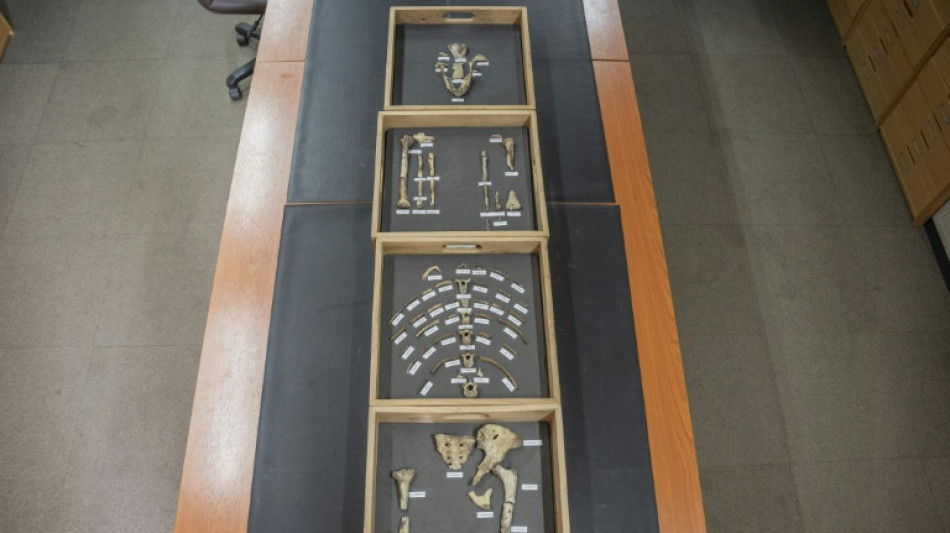
-
 High-speed train collision in Spain kills 39, injures dozens
High-speed train collision in Spain kills 39, injures dozens
-
Gold, silver hit peaks and stocks struggle on new US-EU trade fears

-
 Auger-Aliassime retires in Melbourne heat with cramp
Auger-Aliassime retires in Melbourne heat with cramp
-
Melbourne home hope De Minaur 'not just making up the numbers'

-
 Risking death, Indians mess with the bull at annual festival
Risking death, Indians mess with the bull at annual festival
-
Ghana's mentally ill trapped between prayer and care

-
 UK, France mull social media bans for youth as debate rages
UK, France mull social media bans for youth as debate rages
-
Japan PM to call snap election seeking stronger mandate

-
 Switzerland's Ruegg sprints to second Tour Down Under title
Switzerland's Ruegg sprints to second Tour Down Under title
-
China's Buddha artisans carve out a living from dying trade

-
 Stroking egos key for Arbeloa as Real Madrid host Monaco
Stroking egos key for Arbeloa as Real Madrid host Monaco
-
'I never felt like a world-class coach', says Jurgen Klopp

-
 Ruthless Anisimova races into Australian Open round two
Ruthless Anisimova races into Australian Open round two
-
Australia rest Cummins, Hazlewood, Maxwell for Pakistan T20 series

-
 South Korea, Italy agree to deepen AI, defence cooperation
South Korea, Italy agree to deepen AI, defence cooperation
-
Vietnam begins Communist Party congress to pick leaders

-
 China's 2025 economic growth among slowest in decades
China's 2025 economic growth among slowest in decades
-
Gauff, Medvedev through in Australia as Djokovic begins record Slam quest

-
 Who said what at 2025 Africa Cup of Nations
Who said what at 2025 Africa Cup of Nations
-
Grizzlies win in London as heckler interrupts US anthem

-
 Three-time finalist Medvedev grinds into Australian Open round two
Three-time finalist Medvedev grinds into Australian Open round two
-
Auger-Aliassime retires from Melbourne first round with cramp

-
 Rams fend off Bears comeback as Patriots advance in NFL playoffs
Rams fend off Bears comeback as Patriots advance in NFL playoffs
-
Thousands march in US to back Iranian anti-government protesters

-
 Gotterup charges to Sony Open victory in Hawaii
Gotterup charges to Sony Open victory in Hawaii
-
Gold, silver hit records and stocks fall as Trump fans trade fears

-
 Auger-Aliassime retires injured from Melbourne first round
Auger-Aliassime retires injured from Melbourne first round
-
Gauff through, Auger-Aliassime retires as Djokovic begins record quest

-
 China says economy grew 5% last year, among slowest in decades
China says economy grew 5% last year, among slowest in decades
-
Young star Zheng may have to give back Australian Open prize money

-
 Gauff overcomes wobble in winning start to Melbourne title bid
Gauff overcomes wobble in winning start to Melbourne title bid
-
Harry set for final courtroom battle against UK media

-
 'It wasn't clean': Mother mourns son killed in US Maduro assault
'It wasn't clean': Mother mourns son killed in US Maduro assault
-
Louvre heist probe: What we know

-
 Surging billionaire wealth a political threat, Oxfam warns as Davos opens
Surging billionaire wealth a political threat, Oxfam warns as Davos opens
-
Morocco fans stunned, disappointed as Senegal win Africa title

-
 Senegal fuelled by 'injustice' in AFCON final triumph, says hero Gueye
Senegal fuelled by 'injustice' in AFCON final triumph, says hero Gueye
-
Morocco coach Regragui laments 'shameful' scenes in AFCON final defeat

-
 Maye, Boutte wonder-catch carry Patriots past Texans
Maye, Boutte wonder-catch carry Patriots past Texans
-
Train collision in Spain kills 21, injures dozens

-
 Brazilians Abner, Endrick help Lyon climb to 4th in Ligue 1
Brazilians Abner, Endrick help Lyon climb to 4th in Ligue 1
-
Barca beaten at Real Sociedad as Liga title race tightens

-
 Socialist to face far-right candidate for Portugal's presidency
Socialist to face far-right candidate for Portugal's presidency
-
Senegal stun hosts Morocco to win AFCON title after final walk-off protest

-
 Syria's leader agrees truce with Kurds after govt troops advance
Syria's leader agrees truce with Kurds after govt troops advance
-
Morant shines as Grizzlies top Magic in London

-
 Real Sociedad end Barca winning streak to tighten Liga title race
Real Sociedad end Barca winning streak to tighten Liga title race
-
Senegal stun hosts Morocco to win AFCON title after ugly scenes mar final

-
 AC Milan in touch with Inter thanks to Fullkrug's first Serie A goal
AC Milan in touch with Inter thanks to Fullkrug's first Serie A goal
-
Lyon climb to fourth in Ligue 1 with victory over Brest


Human ancestor Lucy still has secrets 50 years after discovery
She was, for a while, the oldest known member of the human family. Fifty years after the discovery of Lucy in Ethiopia, the remarkable remains continue to yield theories and questions.
In a non-descript room in the National Museum of Ethiopia, the 3.18-million-year-old bones are delicately removed from a safe and placed on a long table.
They consist of fossilised dental remains, skull fragments, parts of the pelvis and femur that make up the world's most famous Australopithecus afarensis, Lucy.
The hominid was discovered on November 24, 1974, in the Afar region of northeast Ethiopia by a team of scientists led by Maurice Taieb, Yves Coppens, Donald Johanson, Jon Kalb, and Raymonde Bonnefille.
The 52 bone fragments, amounting to some 40 percent of Lucy's skeleton, was, at the time, the most complete ever found, and revolutionised the understanding of our ancestors.
The skeleton was initially called A.L-288-1, in reference to Afar and its geolocation.
But the researchers nicknamed it Lucy after The Beatles' song "Lucy in the Sky with Diamonds", which they listened to after celebrating their discovery.
Lucy walked on two legs and is thought to have died aged between 11 and 13 -- considered an adult for this species. She was 1.10 metres tall (3.6 feet) and weighed 29 kg (64 pounds).
For Sahleselasie Melaku, the 31-year-old head of the palaeontology department, Lucy's discovery represented an emergence from a "dark age" in our understanding of human ancestors.
"The impact of the discovery was very big in the discipline and even the whole world," he told AFP.
Lucy showed that members of the human family existed beyond three million years ago, and she also provided a template for fitting together later bone discoveries.
The amount of information that can be gleaned from the bones has allowed some highly detailed theories about Lucy's life.
A slightly deformed vertebra, for instance, "means she probably had back problems", said Melaku.
- 'Exceptional' -
Jean-Renaud Boisserie, a paleonthologist specialised in Ethiopia and the research director at the French National Centre for Scientific Research said it was an "exceptional" breakthrough for the discipline.
"We basically knew very little about the period of three million years ago, and we had nothing as complete," he said.
Lucy was often described as "the grandmother of humanity", but more recent discoveries suggest she may have been more like an aunt or a cousin, experts say.
Skeletal finds in places like Ethiopia, South Africa and Kenya have complicated the picture and led to much debate about when different species of hominid emerged and which should be classified as part of the human or chimpanzee families.
The discovery of "Toumai" in Chad in 2001 -- a skull dated to six or seven million years old -- suggested the human family may go much further back than previously thought.
Meanwhile, Lucy has yet to reveal all her secrets.
A study published in 2016 argued she spent a third of her time in trees, where she nested, and had highly developed upper limbs.
Another study that year in the American journal Plos One theorised that she died after falling from a tree.
A 2022 study in Nature, focused on Lucy's pelvis, concluded that newborn members of Australopithecus had a very immature brain, like human newborns today, and required parental support to survive.
"There are a lot of unanswered questions," said Melaku with a smile. "Especially, we don't know much more about the early livelihoods of these early human ancestors."
The museum receives frequent requests to study it, but the iconic skeleton no longer leaves Ethiopia.
Wider scientific progress and advanced equipment are opening up new avenues for research.
"The studies that can be carried out on her, on her peers, pose the scientific questions of tomorrow," said Boisserie.
"Material as exceptional as this plays a driving role in the evolution of research."
D.Bachmann--VB



